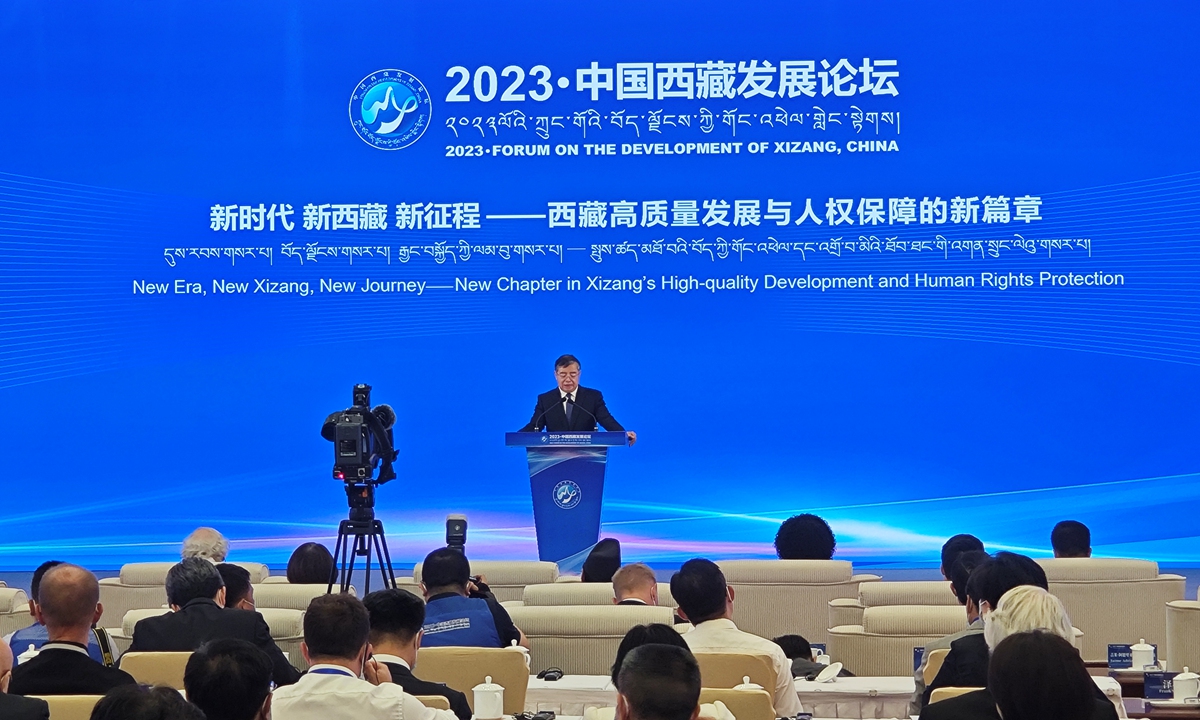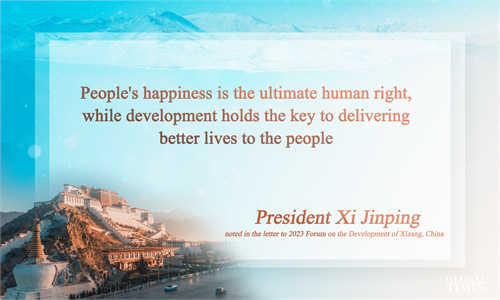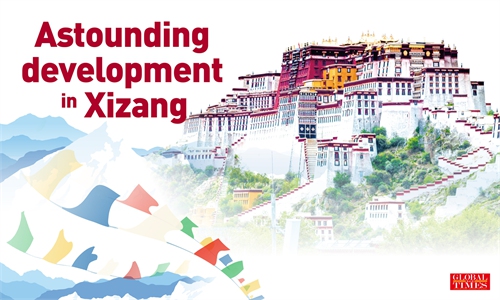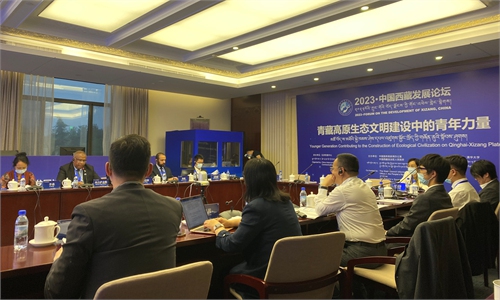
Li Shulei, a member of the Political Bureau of the Communist Party of China Central Committee and head of the Publicity Department of the CPC Central Committee, addresses the 2023 Forum on the Development of Xizang, China. Photo: Yin Yeping/GT
Xizang Autonomous Region in Southwest China has made remarkable achievements in recent years through the exploration of high-quality development and common prosperity backed by the strong support of the central government, as stated by government officials and industry representatives on the sidelines of the 2023 Forum on the Development of Xizang, China in Beijing on Tuesday.
The achievements in Xizang have also set the course for sustainable development in the region and beyond, as the Global Times learned from the event.
Speaking at the forum, Yan Jinhai, Deputy Secretary of the Communist Party of China Xizang Autonomous Regional Committee and Chairman of the People's Government of Xizang Autonomous Region, shared statistics to demonstrate how the region has taken on high-quality development for common prosperity under the government's strong support.
Xizang's per capita GDP rose from 114 yuan ($16) in 1951 to 58,438 yuan ($8,284) in 2022, an increase of over 110 times in comparable terms.
Xizang has gained a special focus in ending poverty, and all 74 poor counties (districts) in the region have been lifted out of poverty.
Absolute poverty has been eliminated and a moderately prosperous society has been built in all respects, which Yan said "sets a shining example in human history of respecting and protecting human rights."
Local villagers in Daman Village, located in Xigaze, Xizang, were among the first witnesses to poverty alleviation. They now live in spacious new houses, and they have set up professional cooperatives and enjoy modern public services such as education and healthcare, and their per capita disposable income has increased from less than 1,000 yuan a decade ago to nearly 15,000 yuan today.
Sang Ba, a local textile producer, told the Global Times on Tuesday how his company expanded from just seven people in 2008 to more than 100, with the average disposable income of employees jumping from a few hundred to up to 30,000 yuan today.
His production line is automated, which adds efficiency while reducing costs, helping his products gain an edge in domestic and overseas markets.
"Without the guidance and support of the government, we wouldn't be able to come this far," Sang Ba said.
Xizang's development also highlighted the education sector. According to the region's government, the level of education has risen from an illiteracy rate of over 95 percent and an enrollment rate of school-age children of less than 2 percent before the liberation to the basic elimination of illiteracy and the comprehensive establishment of a 15-year public education system from preschool to senior high school.
Xizang's development achievements also set an example for the sustainable development in other countries.
Bishnu Pukar Shrestha, the Nepali Ambassador to China, applauded at the forum for China's efforts to achieve a robust economic recovery and the resilience of the people in the region.
Xizang's experience and good practices in poverty reduction set a good example for Nepal, he said, noting that "the remarkable achievements made by China in the fields of human capital development, adoption of modern farming and agricultural technologies, and rural development projects are of special importance in our context."
Maria Gustava, the Ambassador of Mozambique to China, told the Global Times at the forum that Xizang's poverty alleviation and economic development inspired her.
In a recent trip to Xizang, she was impressed that people have electricity even in very remote areas, as well as airports in very difficult areas like mountains.
Roland Boer, a professor of the School of
Philosophy of Renmin University of China, said at the forum that the core human right is the right to socioeconomic well-being, of what we now call common prosperity.
After Xizang's liberation from a type of feudal system, with slave-like serfs bound to hard labor for wealthy landlords, Xizang has achieved the level of a xiaokang society, a moderately prosperous, peaceful and healthy society, the expert said.
The high-quality development of the region is reflected in the longer life expectancy of the locals.
Data shared by the region's government on Tuesday shows that the average life expectancy in Xizang has more than doubled from 35.5 years at the beginning of the peaceful liberation to 72.19 years now.



